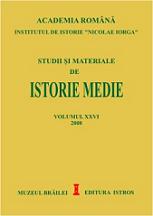Numele din familia regelui Matia Corvinul – de la izvoarele de epocă la istoriografia contemporană
Names in the Family of King Matthias Corvinus: from Contemporary Sources to Present Historiography
Author(s): Ioan Aurel PopSubject(s): History
Published by: Institutul de Istorie Nicolae Iorga
Summary/Abstract: The contribution of onomastics in the Hunyadi family to a better understanding of the history of the fifteenth century and of subsequent collective mentality until contemporary times is addressed. A first analysis is made of the name of the son of Iancu de Hunedoara (John Hunyadi), born in Cluj in 1443 around the celebration day of Apostle Matia, and receiving this name exactly, instead of that of Matei (Matthew), such as the apostle appears in the church calendar. An explanation is given of how the real name of the king became Matei in Romanian historiography. Follows an analysis of the name of Corvin (Corvinus), borne by King Matia and his successors, but not by his forefathers, indicating the illustrious origin of the king, with Romanian ancestors, invariably presented by the Humanists as descendants of the Romans. Several aspects of genealogy are further on addressed, with a special focus laid on the Romanian onomastics of Matia Corvin’ paternal relatives. A more extensive section is dedicated to the names borne at the time by the Voivode of Transylvania, Governor of Hungary and General Knight of the Kingdom – the famous crusader who died in 1456 – which all derive from Ioan (John), pronounced and written in varied ways, according to the ethnicity, language, and denomination of the contemporaries. The author demonstrates that Iancu, the name given to the hero of Belgrade by the Romanians, the Serbs, the Greeks, the Croatians, the Bulgarians, etc., and which is a diminutive of Ioan, is just as legitimate as János, Johannes, Giovanni, etc.; the name of Iancu was in use among the Romanians in the fifteenth and sixteenth centuries; and, the hero of Belgrade bore it during his life in the Romanian, South-Danubian, Dalmatian, and even Italian milieus. Thus, the use of the name of Iancu was not forcibly imposed by the communist regime. This name already existed in the Romanian collective conscience during the period of Romanticism. As a result, the attempts made by some historians nowadays to banish its use by the general public and the specialized circles is superfluous, detrimental, and devoid of any support in terms of philology or history.
Journal: Studii şi Materiale de Istorie Medie (SMIM)
- Issue Year: 2008
- Issue No: XXVI
- Page Range: 111-138
- Page Count: 28
- Language: Romanian
- Content File-PDF

